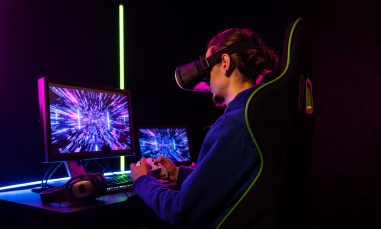Our collaboration with Ulatus for the translation of our in-game content was instrumental in breathing life into our narrative, resulting in an authentically immersive gaming experience.

Our client, a significant presence in the video game industry, established a strong foothold in 1992 and has since developed over 100+ games. They have earned widespread acclaim for their immersive games, which captivate players with compelling narratives and engaging gameplay experiences. With a track record of developing titles for a diverse range of platforms, including PlayStation, PlayStation Vita, Nintendo Switch, and many others, they consistently demonstrate their versatility and commitment to delivering top-tier gaming experiences worldwide.
The client sought to localize their game which was a historical Japanese love story, originally written in an old-style kana script. The client's objective was to make the entire storyline comprehensible to modern-day gamers and wanted a translation partner who could thoroughly grasp their requirements and successfully complete the project within the specified timeframe, meeting all of their needs.
The game's narrative transported us 150 years into the past, immersing us in Japan just after the fall of the Samurai era in 1868. At its core, a captivating love story unfolded against the backdrop of this historical epoch. The language of the time, predominantly old-style Kana, posed a unique challenge due to its stark differences from contemporary Japanese. Our mission was clear: preserve the essence of the original content while delicately translating it into English. It wasn't just about words; it was about capturing the narrative's soul, ensuring the true meaning and emotions remained intact in their new linguistic home.
Navigating the challenge of linguistic space constraints in this video game translation was paramount. These constraints, which dictated the amount of text that could fit in a given area, required firsthand gameplay experience for accurate and consistent translation. The reason was not just linguistic proficiency, but understanding how every word impacted the player's immersion in the form of character dialogues. This intimate knowledge would further ensure that the player's experience remain cohesive, resonating with them as if the game had been crafted specifically in their language.
In the realm of gaming, where immersion is paramount, Ulatus embarked on the translation of over 100 captivating narratives. Our client requested regular updates and real-time project tracking , which necessitated meticulous planning to meet tight deadlines. This ambitious translation project not only involved linguistic precision but also the cultural nuances that made each narrative truly resonate with its new audience. It was like weaving a tapestry of stories from different corners of the world, where every thread, word, and gesture matters to create a seamless and immersive gaming experience.
The project's success hinged on a meticulous linguist selection process, prioritizing expertise in gaming translation. We scrutinized portfolios to gauge their ability to convey gaming nuances and simultaneously factored in the unique historical context—the dawn of the Meiji era after the fall of the Samurai. This led us to prioritize linguists with backgrounds in Japanese history, culture, and language studies. The final selection harmoniously balanced linguistic prowess, gaming acumen, and historical knowledge. The chosen linguists excelled in conveying both gaming and historical dimensions, culminating in an immersive, authentic narrative experience.
An essential aspect of video game translation entails a profound comprehension of the game's visual elements to enable precise and effective translation. In this project, our linguists, who were enthusiastic gamers, excelled in this regard. They not only consistently maintained distinct personalities for each character but also dedicated themselves to capturing the fundamental essence of the characters' dialogues within the confines of linguistic limitations. Moreover, contextual translation played a vital role. The linguists were granted access to the gameplay, which greatly facilitated their understanding of the game's pace and character interactions, enriching the overall gaming experience.
Given the extensive number of interconnected narratives within the project, it became imperative to establish a comprehensive translation style glossary. This glossary served as a pivotal tool in our translation process, meticulously outlining the desired tone, style, and cultural references to be employed consistently throughout the narratives. By crafting this detailed reference guide, we were able to achieve a remarkable level of uniformity across the translations. It ensured that every narrative thread seamlessly wove into the broader tapestry of the project, maintaining a harmonious and immersive experience for the audience. By utilizing advanced project management tools, we achieved collaborative project tracking with our linguistic teams and provided real-time progress updates to the client. This, in turn, guaranteed timely delivery of each narrative module to the client and facilitated prompt reviews in response to any translation feedback received.